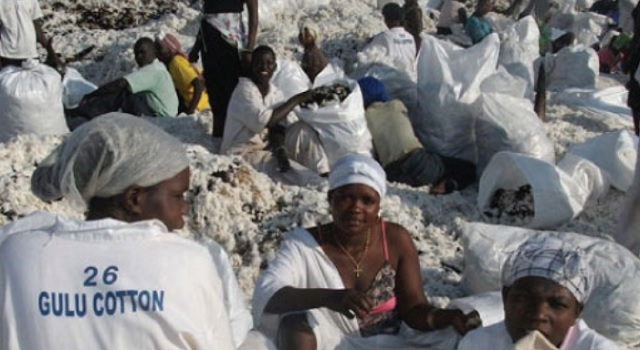
Local players unhappy with govt’s shelving of biotechnology law
Kampala, Uganda | ISAAC KHISA | When confined field trials for insect-resistant and herbicide-tolerant BT cotton started at the National Semi Arid Resources Research Institute (NaSARRI) with support from the US-based Monsanto in 2006, researchers thought farmers would no longer worry of pesticides and weeds in the garden.
The researchers rested their hopes on a gene that is inserted in the cotton – Bacillus thuringiensis (BT) to enable the crop produce proteins that are toxic to bollworms. The crop was also engineered to be tolerant to herbicide Roundup so farmers could forego weeding by simply spraying the crops with the herbicide.
The trials were carried out in two cropping seasons of 2009-2010 and 2010-2011 in the traditional cotton growing areas of Serere in the East and Kasese in the south-western Uganda.
Though preliminary findings confirmed positive results, the trial that was meant to be conducted in three cropping seasons came to a halt citing absence of bio-safety laws and regulations.
Parliament passed the bio-safety bill in October, last year, but it was returned by President Yoweri Museveni two months later with a request to address numerous concerns.
Faced with this dilemma, researchers now say the government seems to have missed the opportunity to utilise the technology to boost cotton export volumes and the recovering of the local textile industry.
“We feel that growing BT cotton was a missed opportunity that would have revived the struggling cotton and textile industry,” said Barbra Zawedde, a coordinator at the Uganda Biosciences Information Centre during the launch of the global status report of biotech crops in Kampala on August. 09.
She said biotech research started in 2003 with the launch of the biotech laboratory by President Yoweri Museveni.
“Since then, we are yet to see any products reach farmers let alone cotton,” she said, “We think it has been too long and it is time for government to tell us its position – abandon the biotech research altogether or sale the research work to other countries that need them including Malawi and Tanzania”
Zawedde, who also works at the National Agriculture Research Institute said researchers feel frustrated, and that it is time for the government to make a pronouncement on whether or not it is interested in using biotech technology currently in use in 24 countries globally.
To make matters even worse, Zawedde said a number of African countries including Ethiopia, Kenya and Malawi are in the final stages of growing BT cotton leaving Uganda that pioneered research on the crop behind.
“This implies that our farmers will start bringing this BT cotton from the neighbouring countries without our knowledge as our export volumes continue to tumble,” she said.
In July this year, Ethiopia became the latest African country to authorize cultivation of biotech crops by granting two approvals for environmental release of BT cotton. With the approval, Ethiopia joins the ranks of South Africa and Sudan that have been growing the crop for some time now.
Biotech crops were first commercialised in the US, Canada, Mexico, Argentina, China and Australia in 1996, and in 2017 more than 17 million farmers in 24 countries planted biotech crops, according to the International Service for the Acquisition of Agri-Biotech Applications (ISAAA).
Four-fifths of the world’s cotton crop is biotech, as are soybean in the same proportion and a third of maize. India is the world’s biggest BT cotton producer, accounting for a quarter of the market share of the world’s cotton production.
Kenya licensed the India- based firm Maharashtra Hybrid Seeds Co (Mahyco)in July this year to import BT cotton seeds for sale to local farmers after the ongoing field trials.
Mahyco is a global agricultural company founded in India in 1964 with operations in Asia and other African countries.
Mahyco will distribute the seeds on behalf of Monsanto, which this year was granted permission by the National Environmental Management Authority (Nema) to conduct the national performance trials on biotech cotton.
The licensing of the firm implies that the country is set to lift a six-year ban on importation of biotech material.
Commercialisation is expected in the next two years. The field trials are currently being conducted in Mwea, Bura-Tana, Katumani, Kampi ya mawe (Makena) and Perkerra in Baringo County.
The project is expected to be completed within 24 months, which is the validity period for the permit issued by Nema. Thereafter, the seeds will be commercialised once proved that that they are indeed resistant to pest and has higher productivity that the current variety.
President Uhuru Kenyatta said in January this year that he was betting on mass production of biotech cotton to create 50,000 jobs and generate KSh20 billion in apparel export earnings this year as part of his final term economic revival plan.
Researchers told be patient
But Charles Mugoya, the chairperson of the National Biosafety Committee, an independent technical committee established under Uganda National Council for Science and Technology, to facilitate the testing and development of potentially useful genetically engineered organisms, said the researchers need to be patient.
“Though the proposed biosafety law has taken long to be passed into an Act, I request that you be patient…I believe that once it is in place, we will benefit from it maximally,” Mugoya said.
He, however, said delay in passing the biosafety law – that has stalled for more than a decade –is regrettable given that a section of the country’s researchers are helping a number of countries including Rwanda, Malawi and Zambia to build capacity in biotech research.
Cotton is Uganda’s third largest export crop after coffee and tea grown in over 60 districts in Busoga, Bukedi, Bugisu, Teso, Lango, Acholi, West Nile, Mid-west and Western regions, according to the state-owned Cotton Development Organisation.
It is grown among smallholder farmers with an average farm size of less than 0.5 hectares and it is the main source of income for some 250,000 low-income households.
However, since the 1990’s when cotton trade was liberalized, Uganda has been a net exporter of cotton lint with over 90% of the locally produced cotton being exported as a raw material.
Domestic consumption of cotton lint has been minimal ranging between 3 – 5% of the total cotton production as a result of few, small to medium sized firms with modest technology and low capacity to utilise available cotton production.
Data from Bank of Uganda (BoU) shows that the country’s total cotton export volumes fell from 102, 149bales in 2004 to 14,703bales in 2008. Though the volumes increased to 235,187bales in 2012, it again fell to 171, 934bales in 2017.
Jackson Jurua, the vice president of the Uganda Farmers Federation said there’s need for government to pass the biosafety law to enable farmers access the new cotton variety.
“Farmers have been waiting for this variety for a long time, and some are giving up on the crop in favour of other crops,” he said.
This new push to have BT cotton on the Ugandan market, however, comes as a San Francisco jury on August 10 ordered agribusiness giant, Monsanto, to pay $289 million to a former school groundskeeper dying of cancer.
The jury said the company’s popular Roundup weed killer contributed to Dewayne Johnson’s terminal illness and was the first of thousands of cases filed in state and federal courts alleging that Roundup causes cancer, which Monsanto denies.
Way forward
Zawedde says there’s need to carry out a study on the cost benefit analysis on whether the country’s exports abroad will be affected by the proposed biotech crops.
Fred Muhumuza, an economists and a lecturer at Makerere University, shares similar views with Zawedde. He says there is need to open up discussions and come up with a cost benefit analysis of biotech technologies.
“We need to think through and trust our scientists. Genetically modified organisms have all the scares just like swimming has all the scares, crossing a road in Kampala has all the scare but it does not mean that whenever there’s a possibility of something going wrong, we should withdraw. We develop means of managing and controlling risks,” he said.
Muhumuza noted that had Uganda been growing biotech soybean, it would have grabbed the Chinese market in the midst of the ongoing tax dispute between the US and China.
China had threatened to impose a 25% tariff on American soybeans as retaliation against the US’ planned move to impose a 25% tariff on the US$50 billion Chinese imports.
The US exports about $14 billion worth of soybeans to China, according to the US Department of Agriculture, and accounts for half of US soybean exports.
 The Independent Uganda: You get the Truth we Pay the Price
The Independent Uganda: You get the Truth we Pay the Price



